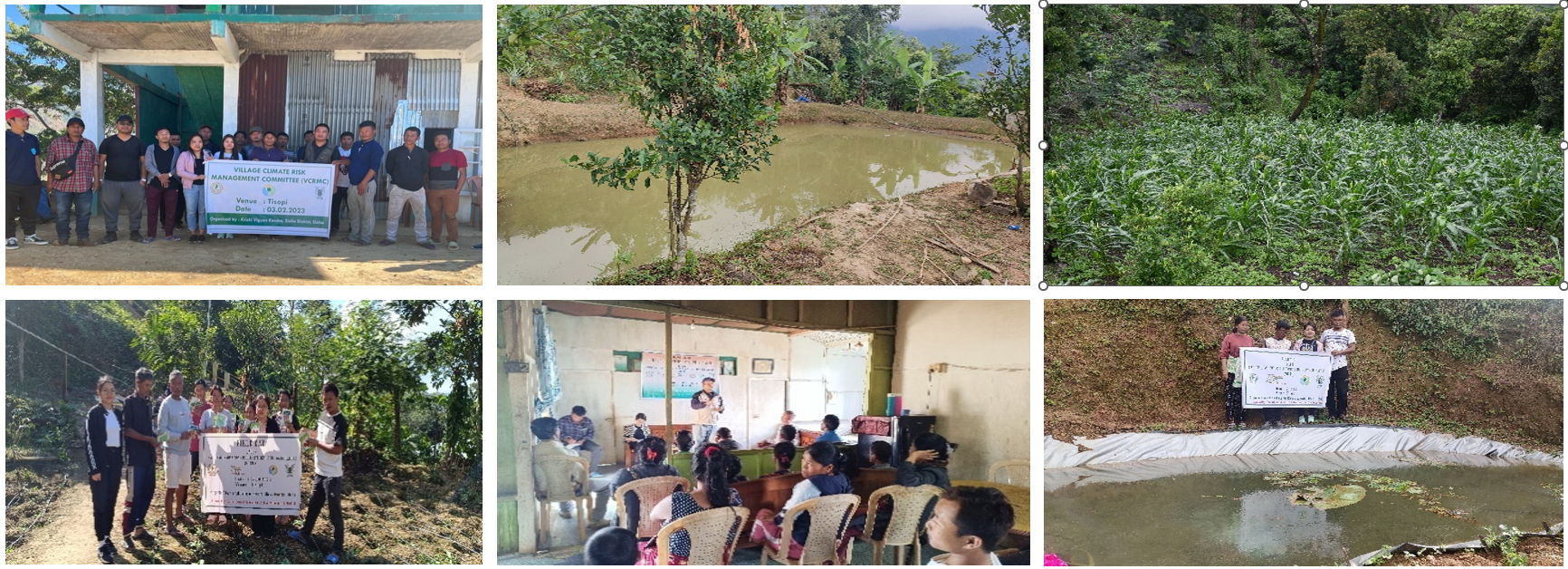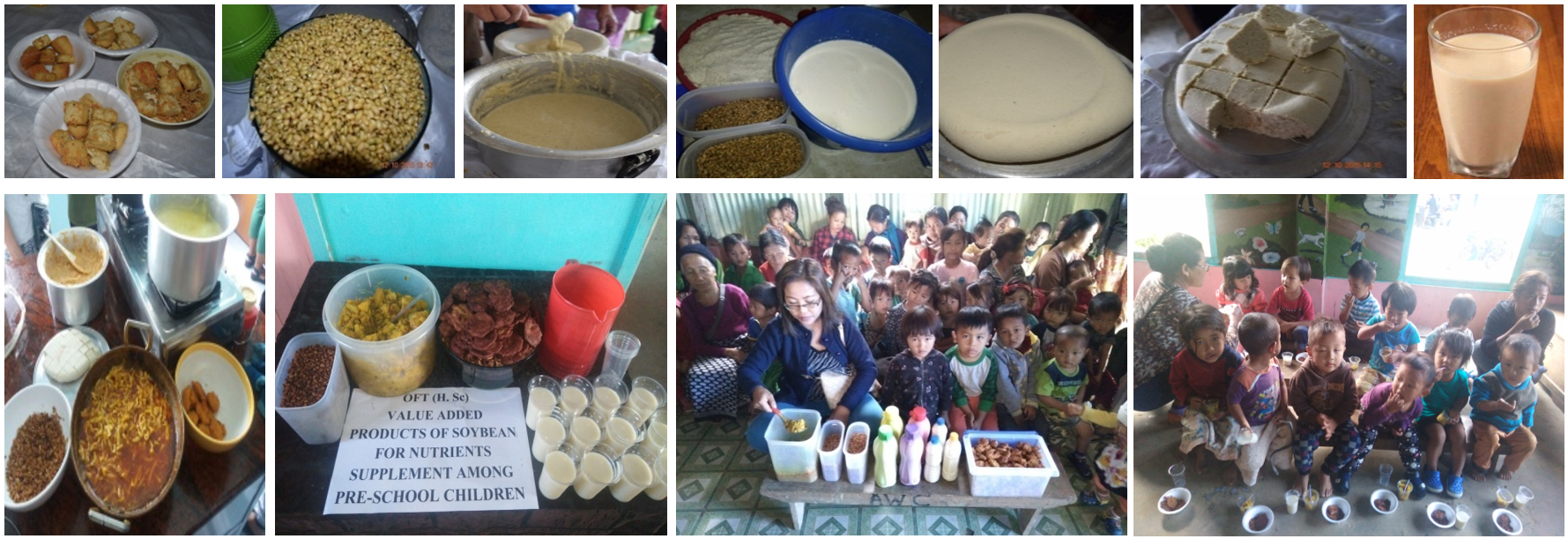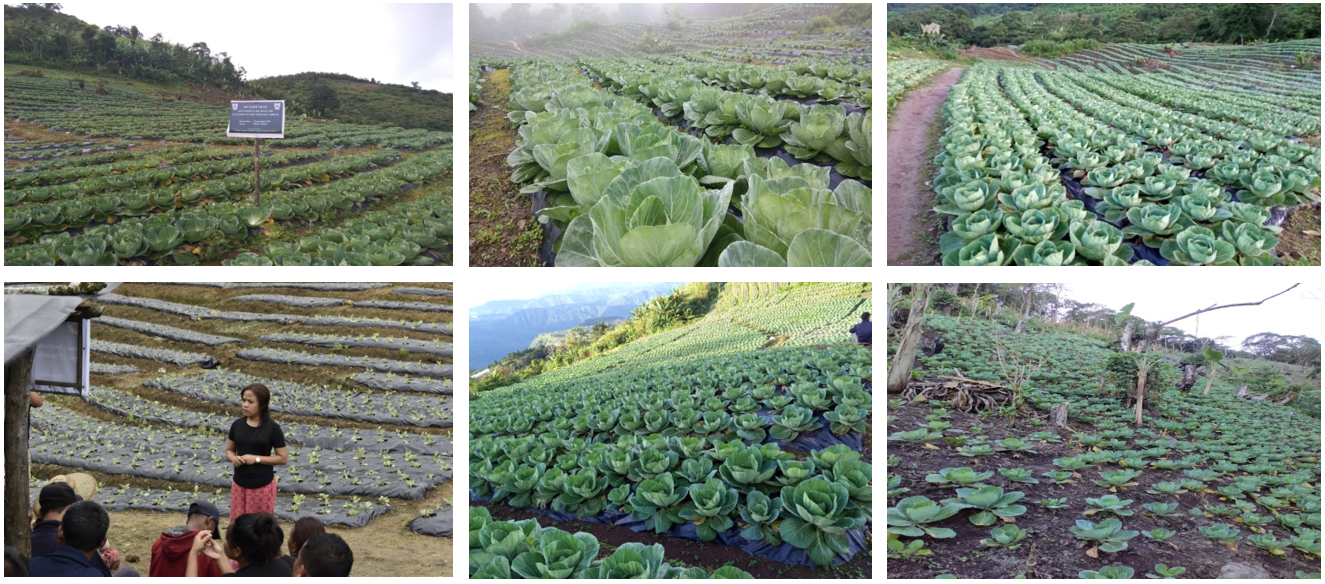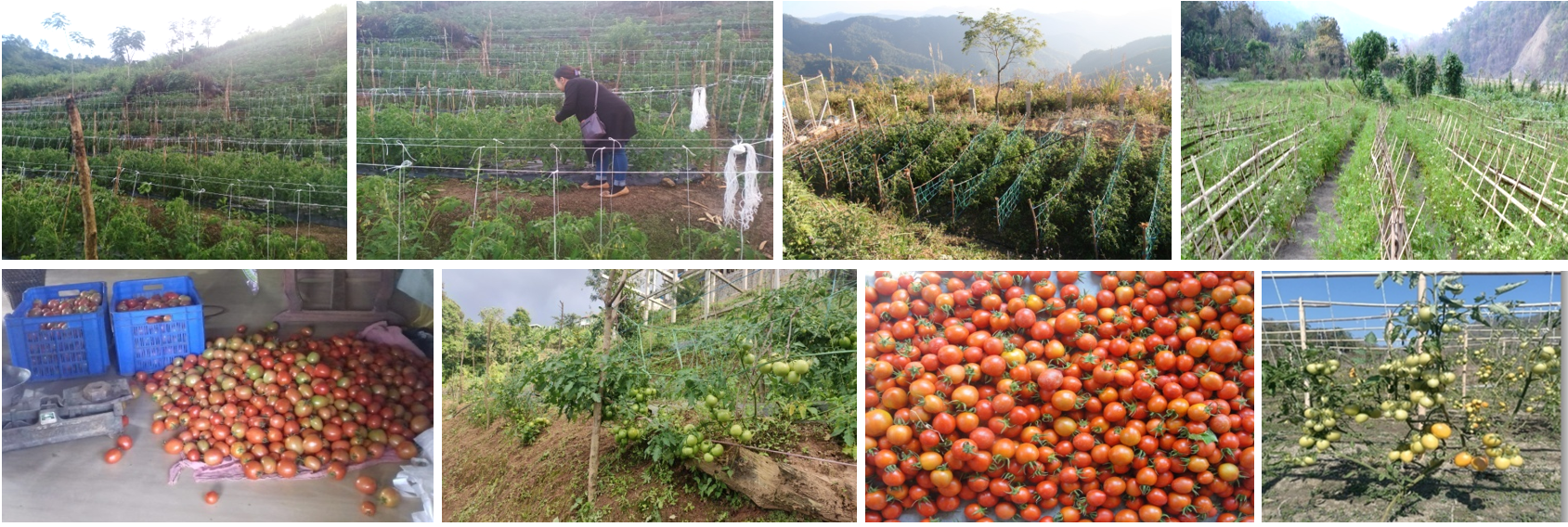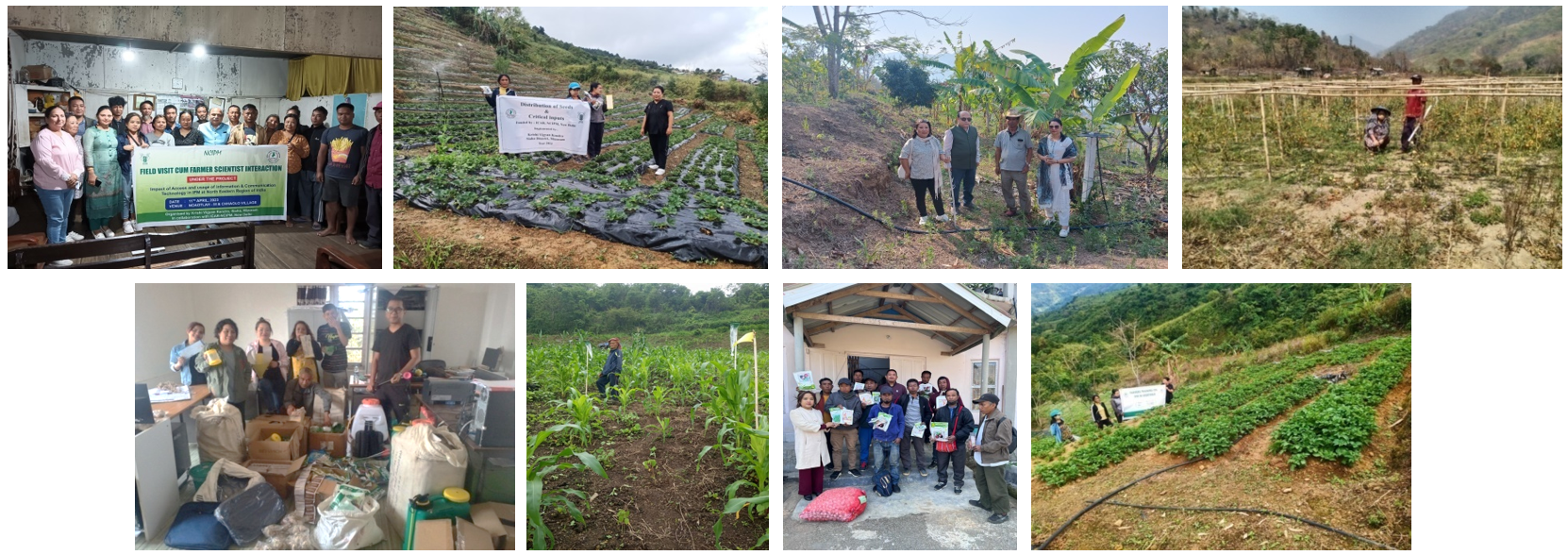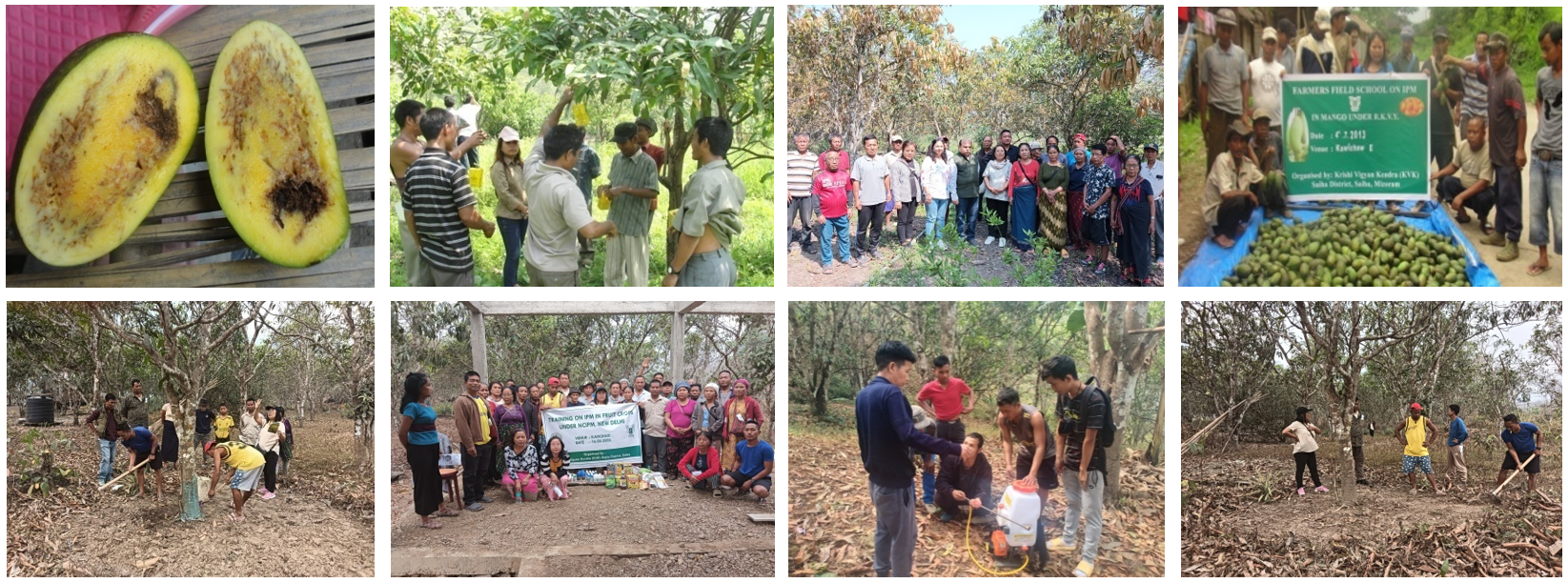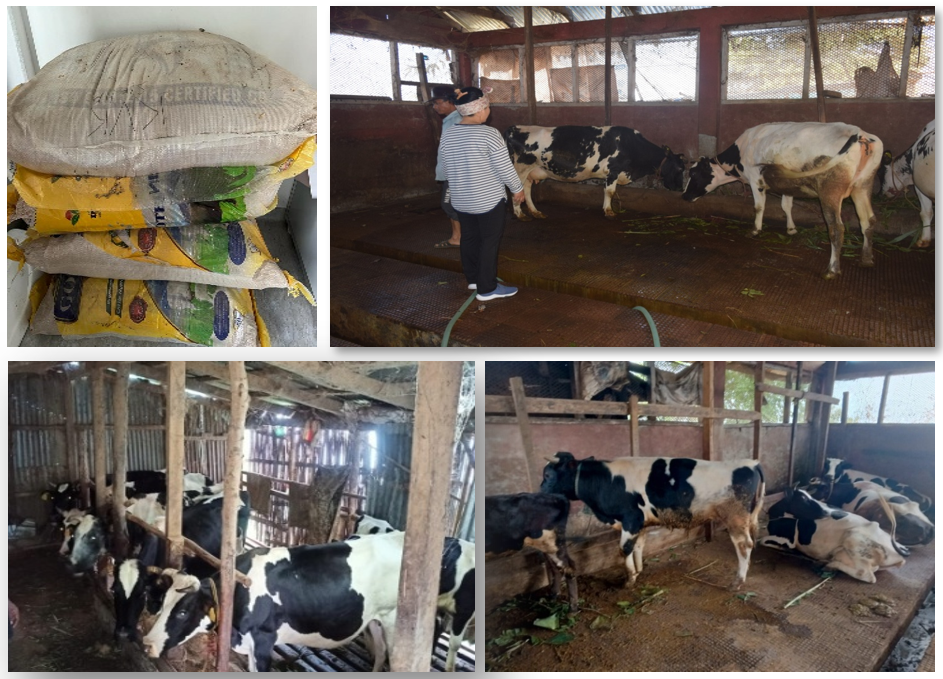
Achievements & Impact by KVK Siaha
Vegetable cultivation under ICAR IARI-NEH ProgrammeKVK,Siaha at the district level has taken initiative and rolls out in many villages by conducting motivational campaign, on-and-off campus training and demonstration on improved package of practices for cultivation of different types or commercial vegetable crop cultivation. Moreover, Seed Distribution programme was conducted for kharif and rabi crops every year since 2019.
The impact of the programme was visible in production and productivity with horizontal spread in the district. After KVK intervention, the production level of vegetables and income of the farmers have increased two to three folds varying from village to village. Moreover, the availability of vegetable increased over the years has led to the change in consumption pattern by shifting focus from inter-state imported vegetables to locally available organic vegetables at higher price. Vegetables are also much fresher from farm to local market. This programmed provides a good opportunity for income round the year for farmers, farm women, rural youths and school dropouts. |
Potato cultivation under IARI NEH ProgrammePotato is one of the most important food crops of the district and is cultivated at Hmaihremzawl located at river bed of NoaotlaTuipui which is 1.30 hours drive from Noaotla village. 6 Farmers planted potato variety Kufri Jyoti tubers acquired from Krishi Vigyan Kendra, Siaha district in the month of November,2021covering 3.5 ha.
The main problem in successful potato cultivation was low yield due to heavy infestation by many insects' pest in recent years but this particular variety performed very well beyond expectation due to timely IPM interventions. In addition, potato cultivation was also successfully introduced in 8 villages in collaboration with IARI, New Delhi namely Chhaolo, Zyhno, Chheihlu, Siata, Tisi, Lopu, KM-10 and Lobo covering 11 ha. |
Integrated Pest Management in Rice and Vegetable Crops under NCIPM, New DelhiKVK took up a project on IPM in rice and vegetable crops which was sponsored by National Centre for Integrated Pest Management (NCIPM), New Delhi from 2019 till date. Initially, 5 villages were selected for this project viz. Kiasi and Phura village for IPM in rice and Kaochao 'E' village for IPM in fruit crops and Lobo and Noaotla III villages for IPM in vegetable crops.
50 farmers each were selected as beneficiaries for this project in each village. The project was really successful and in the coming years more beneficiaries were included in the project and it keeps on expanding to several other villages. At present, the project has expanded to 50% of the villages in the district and is continuing to expand. Under this project, different plant protection equipments, chemicals, tools, etc. were distributed to farmers and trainings and method demonstrations on IPM were conducted as well. Distribution of inputs like pipe, sprayers, insect light trap, pheromone lures, yellow sticky traps, etc as well as construction of 2 community water tank have also been carried out under this project. |
Bee keeping under NABARDKVK, Siaha took up a project on ‘Promotion of Modern Beekeeping for Honey Production and Pollination Services’ under the sponsorship of NABARD during 2021 to 2023 at Lobo village. Thirty farmers were selected as beneficiaries and they were divided into two Self Help Groups, consisting of 15 members each. First interaction with farmers and baseline survey for suitability and feasibility for implementing the project was held at Lobo on Dt.12.08.2021 and Orientation Programme on the project was held on Dt.25.08.2021 along with NABARD Officials at Lobo village. Different seeds like chilli, brinjal, bittergourd, mustard,etc. were distributed to the selected beneficiaries along with 90nos. of bee boxes, 2 nos. of honey extractor, gloves, swarming bags, protection hat, smoker, queen excluder, etc.
The project was highly successful and the SHG members are now producing honey which feeds the local market as well as being distributed to other districts of Mizoram. Packaging materials and labeling was contributed by KVK for the farmers. Crop production in this area was also considerably increased and farmers from other villages have also started to take up bee-keeping in their farms. |
Mushroom ProductionKVK Siaha conducted training among rural youth on mushroom production, Sponsored by MAMETI during 11-16th March 2019. 15 number of only interested trainees were selected for the training. It was a successful training that after attending 6 days skill training programme, they started establishing mushroom production unit thus producing mushroom within a month. Fortunately, in 2020 project on Socio-Economic Empowerment of Tribal Farmers through Oyster Mushroom Spawn production and Cultivation in Siaha district was conducted under the sponsorship of NABARD. Spawn production unit was then set up at KVK Complex, which has been producing and supplying mushroom spawn to mushroom cultivators in Siaha district. It is notable that major requirement of mushroom cultivators of the district has been adequately served by the initiative with a favourable outcome of doing away with procurement of spawn from outside the state.
Production is continuing till date and fresh mushroom is now available in the district which is a big achievement. However, mushroom demand is yet to be met and many mushroom cultivators are coming up from different parts of the district with increase in number of trainings and also increase in number of spawn production from KVK Spawn production unit. Targets for increase in number of trainings and number of spawn productions were raised for the coming years with an aim to supply spawn to the neighboring districts as well. |
Strawberry cultivation-A Life changer for Noaotla – III VillageKVK has participated in cultivation of strawberry at Siaha district right from supply of strawberry plantlets to packaging and distribution of the end products as well as its value addition. Initially, base line survey was conducted and the prioritized problems of the village were thoroughly discussed by conducting group meeting with the active involvement of KVK Scientists. Farmers training and method demonstration on package of practices, Kisan Gosthis and farm school in IPM measures were also carried out. Cultivation was carried out in open field condition in terraces under poly-mulched condition and sprinkler irrigation system.
After realizing the success of Mr. N. Lalsiama, Jhum farmers in the area got motivated and have diverted from Jhuming to strawberry cultivation in small scale. He provided the runners to his fellow farmers in the same village and also to farmers from other district for horizontal expansion. The variety has been cultivated widely within the State. With the introduction of the crop, most of the farmers have replaced their crops with strawberry. At present, 30 farmers have cultivated strawberry along with other crops. |
NICRA ProjectNational Innovation on climate Resilient Agriculture (NICRA) is a network project of ICAR consists of four components Strategic Research, Technology Demonstration, Capacity Building, Sponsored/ Competitive Grants. Tisopi village was selected as the first village for demonstrating the climate resilient technologies. The project was started in 2021-2022. The farming systems in selected village is divided into Farming System Typology (FST) based on the environment and climate of the area.
Some of the successful technologies adopted in the village are Farm Ponds, Mulching, Intercropping of maize with soybean, Community nursery, Backyard poultry farming, Low-cost deep litter housing for pigs. Custom Hiring Centre was also implemented in the village and equipment’s which were kept for custom hiring were brush cutter, knapsack sprayer, chain saw, two wheeled tractor, mini plough machine, mini power tiller, water pump sets. |
Supplementary Nutrition by Utilizing Value Added Products of SoybeanThrough this trial, KVK, Siaha provided soy products as mid-day meal among pre-school children (3–4 yrs) to uplift nutritional status and to overcome specific deficiency diseases and to combat malnutrition. Training was conducted on ‘Healthy Meal Pattern’ among parents and Anganwadi workers. Training was conducted on ‘preparation of soy milk, soy paneer, soy nuts and soy pakora which was distributed among pre-school children.
Before this intervention, soybean was consumed only as fermented form in the state which was not preferred by children. Introducing different value added soybean product by KVK was highly appreciated by rural women for its nutritional facts and abundance. |
Nutritional Diet for Pregnant WomenThis On Farm Testing was conducted to provide nutritional education on maternal dietary intake, maternal weight gain & pre-natal development of pregnant women in Siaha district which records upto 45% IMR in 2015-2016. Training on ICMR-Maternal Diet Plan was conducted and demonstrated on Meal planning for pregnant women using locally available iron rich food. Intervention on Maternal Nutrition focusing on antenatal care through provision of iron, folic acid and zinc supplements, nutrition counseling and nutritious food supplementation in specific areas have been successful in reducing the prevalence of low birth weight.
The ability of a mother to provide nutrients and oxygen for her baby is a critical factor for fetal health and its survival. Failure in supplying the adequate amount of nutrients to meet fetal demand can lead to fetal malnutrition. |
Nutritional Kitchen GardeningOn Farm Testing was conducted to promote Scientific technology on cultivation of different varieties of vegetables in kitchen garden to meet the nutritional requirements of a family. Vegetables available in the market were not fresh and healthy due to long transportation and use of preservatives, pesticides and insecticides. Different varieties of vegetables were introduced on need basis and depending on the choice of the family.
The vegetables freshly harvested taste better from kitchen garden. It also saves time of the farmer in buying vegetables from the market. The family expenditure for buying vegetable was decreased to 40% after taking up kitchen gardening. |
Successful cultivation of Cabbage at Siaha DistrictBefore KVK intervention crops like maize, ginger, chilli were the major crops in the district. KVK, Siaha then took up interventions on introduction of Rare Ball cabbage variety during Rabi season where the fileds are left fallow. Cabbage variety Rareball which are tolerant to Black Rot, Black Leg, heat and high humidity and are suitable for long distance shipping and dense planting and can weight upto 1.5 – 2.0 kg. Yield was considerably increased with the introduction of this variety to some extent. However, the maximum yield potential was yet to be reached since yield reduction occurs due to pests incidence. Therefore, IPM in cabbage was taken up.
The farmers directly sell their fresh produce to retailers in Siaha town@ Rs.20/kg, excluding the transportation cost which was beared by the retailers during the peak season. The cost of cabbage in the market varies from Rs.50 during the peak season which can reach upto Rs.100 during the lean season. The farmers were really happy to observe such a huge increase in yield and quality of cabbage through adoption these technology and this trial has been carried forward as frontline demonstration in many other villages of Siaha District. |
Successful cultivation of Tomato at Siaha DistrictThe farmers of Siaha are very passionate and hardworking. More than 60 percent of the families are engaged in farming. Tomato was one of the common crops grown in the district but due to lack of technical knowledge they could not get the desirable output with their landholding. Tomato var. Arka Samrat was cultivated from 2019 at Noaotla-III village. Before KVK intervention, cultivation of tomato was taken up only under protected condition and only during rabi season.
Now, with the introduction of resistant varieties, open cultivation of tomato is carried out under large scale in villages like Noaotla-I, Noaotla-II, Lobo, Tisopi, Zyhno etc. Production has also increased considerably. Since the local variety of tomato is very small and has very low shelf life, introduction of varieties like Arka Rakshak and Arka Samrat has eventually replaced the local variety up to almost 80 – 90% in most of the tomato growing villages. Before, staging for tomato was done by bamboo only but now staging is done using only nylon rope and a few bamboo poles which greatly reduces production cost. |
Integrated Pest Management in Rice and Vegetable Crops under NCIPM, New DelhiKVK took up a project on IPM in rice and vegetable crops which was sponsored by National Centre for Integrated Pest Management (NCIPM), New Delhi from 2019 till date. Initially, 5 villages were selected for this project viz. Kiasi and Phura village for IPM in rice and Kaochao ‘E’ village for IPM in fruit crops and Lobo and Noaotla III villages for IPM in vegetable crops. 50 farmers each were selected as beneficiaries for this project in each village. The project was really successful and in the coming years more beneficiaries were included in the project and it keeps on expanding to several other villages.
At present, the project has expanded to 50% of the villages in the district and is continuing to expand. Under this project, different plant protection equipments, chemicals, tools, etc. were distributed to farmers and trainings and method demonstrations on IPM were conducted as well. Distribution of inputs like pipe, sprayers, insect light trap, pheromone lures, yellow sticky traps, etc as well as construction of 2 community water tank have also been carried out under this project. |
Management of Mango Fruit Fly and Fruit Borer Using IPM ModulesKaochao ‘E’ village in Siaha distirict is famous for producing mango (var. Rangkhuai /kawlchaw hai). However, high incidence of fruit fly and fruit borer reduces the yield of mango up to 40-50%. Fruit fly causes fruit drop and rotting of fruits whereas fruit borer reduces its market value. Fruit fly lure and trap was used for management of fruit fly and spraying of Chlorpyriphos @ 2.5ml/l of water at 15 days interval was used for controlling fruit borer. Yield and BC ratio at treated plot was 78q/ha and 3.87 and yield and BC ratio at farmers practice plot was 55q/ha and 2.43.
The trial contributed to 41.8% increase in yield which really boost the income of the farmers and this motivated them to take up IPM measures in their mango orchard till date. |
Supplementation of By Pass protein to lactating cattle to increase milk productionDietary deficiency of By Pass protein affecting the quality and production potential resulting in poor production performances was augmented after supplementation of by-pass protein resulting in increase milk production from 2.25 litres to 3.00litre/day/milching cow.
The Demonstration was conducted in three villages – Tipa, Meisavaih and Chhaolo covering 15 numbers of farmers. This technology is therefore proven to be recommended for dissemination amongst dairy farmers. |
Impacts of KVK Siaha since inception(2008)
- 1Area expansion under HYV : 20%
- 2Varietal/Breed replacement : 10%
- 3Increase in cropping intensity : 30%
- 4Creation of start-ups : 5%
- 5Employment generation : 15%
- 6Income Enhancement : 10-20%
- 7Nutritional Improvement : 10-20%
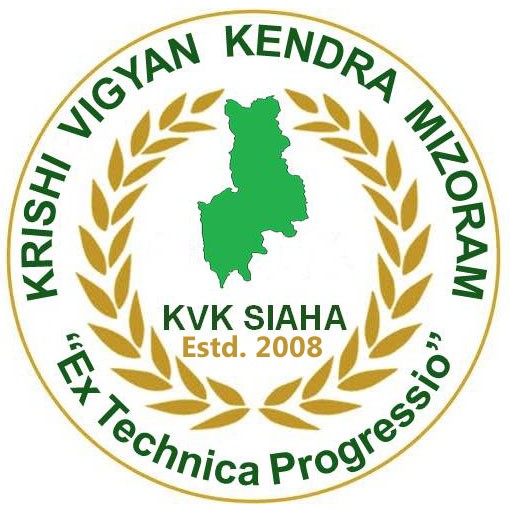


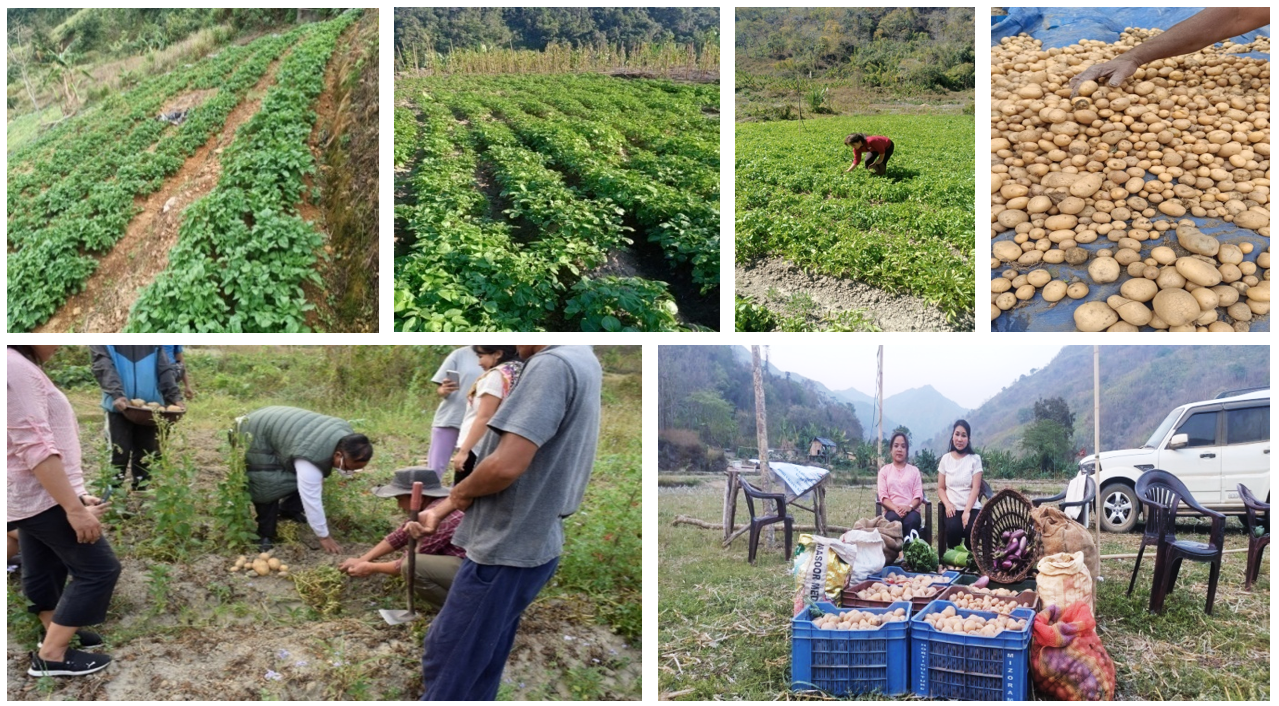
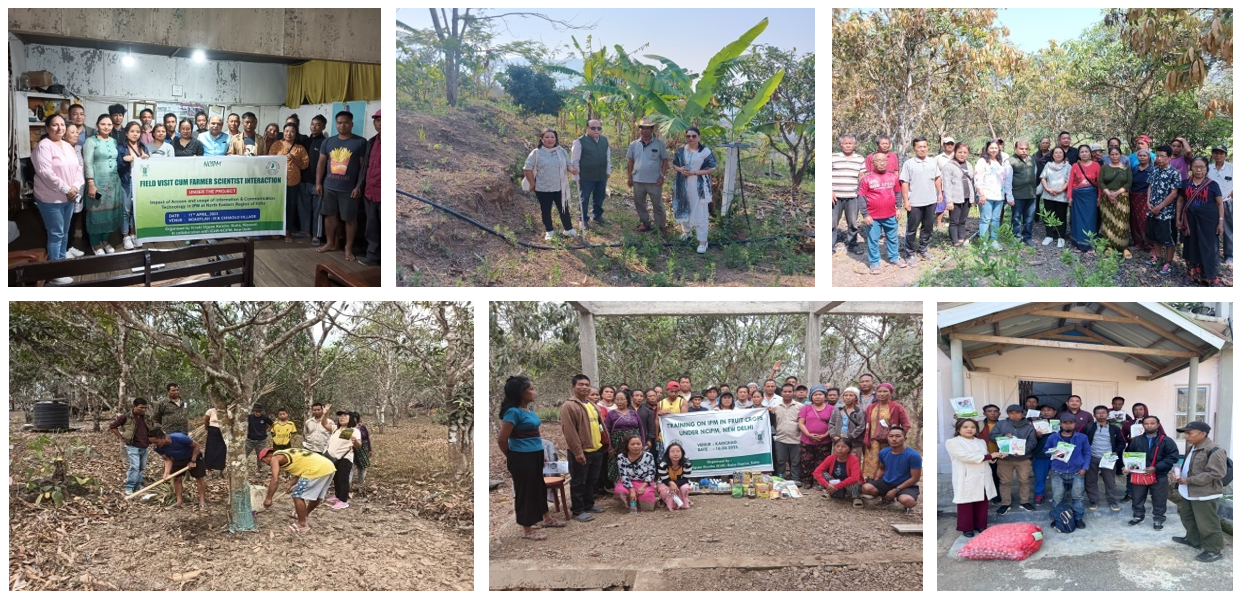


 Image 6: Strawberry cultivation
Image 6: Strawberry cultivation